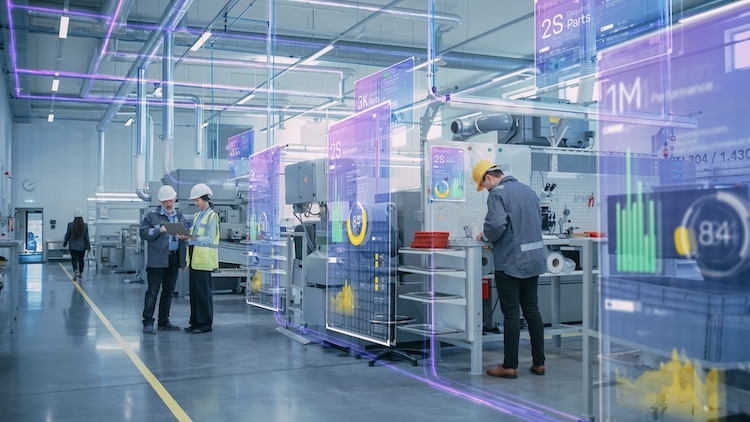The future of manufacturing: Smart, sustainable, and resilient
The manufacturing sector stands on the edge of a revolution, driven by the seamless integration of several innovative technologies. As we navigate through this transformative era, there are a few core advances propelling change. Leading the way are Smart Factories, alongside the advent of Digital Twins and advanced simulation, the evolution of the ‘connected worker’, the surge in automation, AI and machine learning integration, and the paramount importance of sustainability and green manufacturing. These are heralding a new age of efficiency, sustainability, and innovation.
Smart Factories leverage the Internet of Things (IoT) and Artificial Intelligence (AI) to go beyond traditional manufacturing concepts. These factories are not just production facilities; they are intelligent ecosystems that use data analytics and machine learning to optimize every area of the production process. The result is a dramatic reduction in waste, enhanced operational efficiency, and the ability to adapt to market demands. This digital transformation enables manufacturers to predict maintenance needs, streamline supply chains, and minimize downtime, and so set new standards for productivity and innovation.

A pivotal component of this transformation is the concept of Digital Twins. These provide virtual replicas of physical assets, systems, or processes to allow manufacturers to simulate, predict, and optimize performance in a risk-free environment. This year, we can see the use of Digital Twins in revolutionizing product design, testing, and maintenance, and enabling engineers to anticipate problems and assess the impact of potential solutions before they are implemented. This not only accelerates innovation but also significantly reduces costs and time-to-market, providing a competitive edge that is crucial in today’s fast-paced economy.
The arrival of the ‘connected worker’ marks a significant evolution in the skills of the manufacturing workforce. Integrating IoT, augmented reality, and wearable technologies enhances real-time data exchange, facilitating more informed decision-making and vastly improving operational efficiency. These connected workers are equipped with the tools to access vital information, collaborate remotely, and perform tasks with greater precision and safety. This connectivity not only optimizes production processes but also enriches the worker experience, fostering a more engaged and productive workforce.
The integration of AI and robotics in manufacturing processes brings a step change in terms efficiency and productivity. By automating routine tasks and employing machine learning algorithms to improve decision-making, manufacturers can significantly reduce human error and increase production rates. This synergy between humans and machines then creates a more resilient manufacturing ecosystem that can adapt to changing demands and overcoming complex challenges with unparalleled agility.
In 2024, sustainability is no longer just an option, but a necessity. Green manufacturing is center stage, with industries investing in sustainable practices and eco-friendly materials to not only meet consumer demand but also adhere to increasingly stringent regulatory requirements. This shift towards sustainability encompasses the entire manufacturing lifecycle, from raw materials sourcing to production, and ultimately to the disposal or recycling of products. By prioritizing energy efficiency, waste reduction, and the minimization of their carbon footprints, manufacturers are not just contributing to a healthier planet but also unlocking new markets and opportunities for growth.
The manufacturing sector in 2024 is a beacon of technological innovation and sustainability, driven by the adoption of smart technologies, the evolution of the connected worker, and a commitment to green manufacturing practices. As industries continue to embrace these advancements, the future of manufacturing looks not just smarter, but also more sustainable and resilient.
By Marc Booth
Marc Booth is an Advanced Manufacturing expert at PA Consulting, a global innovation and technology consultancy, which believes in the power of ingenuity to build a positive human future. It has deep expertise in consumer and manufacturing, defense and security, energy and utilities, financial services, government and public services, health and life sciences, and transport. Teams operate globally from offices across the UK, Ireland, US, Nordics, and Netherlands.
